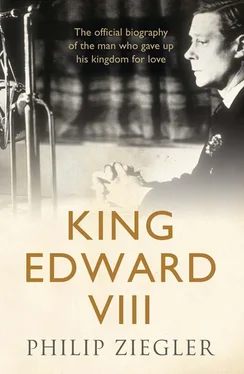Until his Commonwealth tours were behind him he was not to be put to the task of doing something practical to implement his sincere but vague benevolence. He did, however, manage to fit other provincial visits into the gaps between his voyages abroad. Glasgow, traditionally the most republican and fiercely left-wing of British cities, was a tough assignment. The first day he met with boos or sullen silence, but his patent good will, humility and charm gradually prevailed. ‘It’s with the greatest possible relief and gratitude to the people of Glasgow that I can tell you that I’m more welcome here now than I was yesterday,’ he wrote proudly to Freda Dudley Ward. ‘I’ve driven miles through the streets of this vast city today and the people … have been divine to me and were very kind and enthusiastic. Even the men cheered and far more took off their caps than yesterday and there were only 1⁄2 dozen boos.’ Next day was even better; ‘a large crowd gave me a marvellous send off tonight. To TOI, and TOI only, I say that I do feel I’ve been able to do just a little good propaganda up there and given Communism a knock.’ But he did not delude himself that the royal touch could miraculously cure economic ills: ‘I’m afraid the effect of my visit won’t last very long. Things have gone too far, darling, on the Clyde and I take a very gloomy view of the whole situation.’ 23
In Cardiff three months later he was flabbergasted by the warmth of his reception. ‘They’ve all been divine to me today,’ he told Freda, ‘and I’ve seen hundreds of ex-service men and they were the nicest of the lot. Christ only knows why, for they are all having a real bad time and one is so terribly sorry for them.’ 24One of his problems was that the local dignitaries sought to swaddle him in pompous formalities, while his pre-occupation was to meet and be seen by as many people as possible. In Lancashire in 1921, for example: ‘Old Lord Derby has organized this tour marvellously, and I’m able to put in an occasional human touch or stunt of my own, so that I think it’s going well, though I’m afraid my ultra-democratic spirit has annoyed him a few times.’ He had his own way over the programme: ‘No waste of time, such as laying foundation stones and opening things, it was all just driving through miles and miles of crowded streets and stopping at groups of ex-service men and schoolchildren.’ But, as he found still more markedly on his tours abroad, the strain of constantly giving himself to the people, exuding warmth and enthusiastic interest for eight or nine hours on end, was sometimes cripplingly oppressive: ‘I’m down to bedrock, my angel, and Christ only knows how I’m going to scrape through the next 2 days.’ 25
Painfully, he acquired the art of public speaking. Churchill appointed himself his coach. Don’t be ashamed to read a speech, he wrote, but in that case ‘do it quite openly, reading it very slowly and deliberately’. Of course it was better to memorize a text or talk from notes. To accommodate the notes, he advised, take a tumbler, put a finger bowl on top of it, put a plate on top of that, and then arrange the notes on top of the plate, ‘but one has to be very careful not to knock it all over, as once happened to me’. This advice was given before a banquet for the allied leaders in July 1919. Whether the Prince followed Churchill’s somewhat alarming system is uncertain. He memorized the speech, however, and evidently delivered it well. ‘You are absolutely right to take trouble about these things,’ wrote Churchill approvingly. ‘With perseverance you might speak as well as anybody in the land, and naturally and gracefully besides.’ 26The Prince never learned to speak as well as that but he mastered the technique of seeming sincere and spontaneous: ‘He talks very simply,’ wrote Frances Stevenson, Lloyd George’s personal secretary and future wife, ‘just like a schoolboy – saying little things that come into his head as he goes along, and then coming back again to the prepared speech. He charms everyone.’ 27But he never enjoyed making speeches. On another occasion Frances Stevenson congratulated him on his success. ‘He told me he would never get used to speaking in public – he was far too nervous. “My trouble is that I have not a ready pen,” he said. “I find it so difficult even to prepare a speech …” He is a dear thing, with beautiful eyes, but such a boy.’ 28
The vast estates of the Duchy of Cornwall in London and the West Country gave him a chance to do something practical to help the unemployed and the homeless. He invested a large amount of money in new machinery for the Cornish tin mines, set up a farming concern run on cooperative lines and planted 250 acres of forest on the eastern side of Dartmoor. In London he regularly visited his estates in Kennington and the areas of the borough which he owned were conspicuously better furnished with houses than the parts for which the Council was responsible. At a public meeting the Mayor tried to blame his Council’s shortcomings on the policies of the Duchy. ‘Thereupon the whole Labour party who were in the hall rose and practically hissed the Mayor off the platform.’ The socialist leader in the borough later told Sydney Greville that the Prince, after the interview which he had given them, could do anything he liked with the Labour Party. 29
His public life directly after the war was not restricted to the University of Wales, the Royal College of Music and the other pressing calls on his time that Stamfordham had enumerated. ‘Other men might be chained to their desks,’ he wrote wryly in his memoirs. ‘I was metaphorically chained to the banquet table.’ 30A typical day in July 1919 saw him receiving Indian army and navy officers, attending a meeting of the Duchy Council, visiting the Australian YMCA, spending the evening at the Royal College of Music, moving on to a boxing display and ending up at the Embassy night club. In March he was initiated by the Duke of Connaught into the Household Brigade Lodge of the Freemasons. For once it seemed he might be spared a speech, since replies to toasts were traditionally limited to five words, ‘Worshipful Master, I thank you,’ but the rule was waived for the heir to the throne and the Prince had to hold forth about his ‘ardent desire to do his utmost to promote the principles of duty, loyalty and benevolence, on which Freemasonry rested’. 31Closer to his heart was his appointment the following year to be Honorary Colonel of the newly formed Welsh Guards. For one who was often to claim that this was the office which meant more to him than any other, his initial reaction was, however, hardly ecstatic. ‘Of course it is inevitable and is only right I suppose and I more than appreciate the honour etc. etc.!!’ he wrote to a friend. ‘But once a Grenadier always a Grenadier!!’ 32
But such diversions were no more than aperitifs to the daunting meal that was to come. It was Lloyd George who first conceived the idea that the Prince should embark on a series of tours around the Empire, ostensibly to visit the soldiers he had met during the war in Europe and the Middle East and to thank their governments and peoples for all they had contributed to the final victory. Lloyd George knew that demands for reform in the structure of the Empire, pent up during the years of fighting, would now be vigorously put forward. Difficult and probably acrimonious negotiations were inevitable. Anything that could be done to ensure that they were conducted in a spirit of unity, and against a background of harmony, would be of the greatest value. Otherwise the strains might prove too great and the Empire disintegrate. ‘The appearance of the popular Prince of Wales,’ Lloyd George maintained, ‘might do more to calm the discord than half a dozen solemn Imperial Conferences.’ 33
Читать дальше












